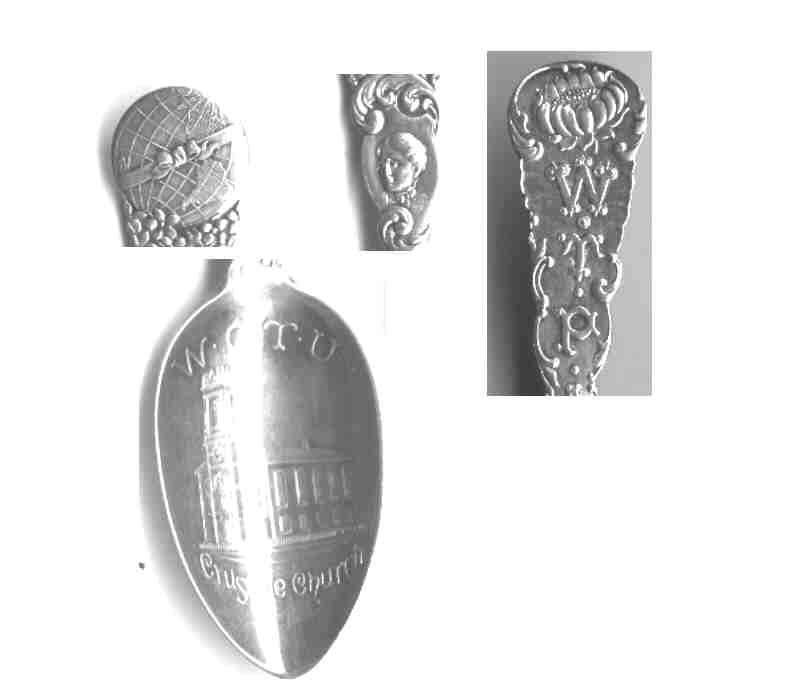
The last twenty years of the 19th century and the first twenty years of the 20th century saw the development and evolution of woman's rights which today we take for granted.
In the late Victorian era, the law often treated woman as property, rather than as independent human beings. A woman was considered to be property of her parents until she married and then she became the property of her husband. Woman were not allowed to vote, but in a few instances they were allowed to hold public office. The wealthier woman were allowed to obtain an education, but an education was often denied to middle class or poorer woman. Under the law of many states, woman were denied many basic property rights.
Many of us have heard of Susan B. Anthony, but in addition to her there were a number of bright educated woman who risked considerable personal fortune to promote the cause of equal political rights.
In 1880, Matilda Bradley Carse founded the WTPA in Chicago. The Woman's Temperance Publishing Association (WTPA), was a stock corporation which reached the height of its power and influence in the early 1890's at which time over one hundred people (mostly female) published the profitable "Union Signal", the largest Woman's publication in the world. Carse was also the founder of the large Chicago chapter of the WCTU (Woman's Christian Temperance Union) which would become the dominant organization representing woman in the country.

The finial is a map of the Western Hemisphere tied with a ribbon to represent the scope of the WCTU. Below is a female figure which is not identified. I suspect that it is Matilda Bradley Carse, but it could be Annie Wittenmyer, the first president of the WCTU, or it could be Francis Willard who was a very active president of the WCTU. The back of the spoon is marked WTPA.

The bowl of this spoon is an embossed picture of the Crusade Church.
On Christmas Eve, 1873, a temperance lecturer's remarks of the preceding evening started a temperance movement in Hillsboro, Ohio which would eventually develop into a nationwide temperance movement.
Mother Thompson and an active group of Presbyterian woman recruited groups of women to come to the church and pray for the abolishment of alcohol. The W.C.T.U. has looked upon this church as the birthplace of the movement, and over the years has celebrated their 50th and 100th anniversaries by a pilgrimage of the national meeting to this location. The church pictured in the bowl is not the same church building that is currently in Hillsboro. The old building was torn down and replaced by a larger building in the late 1890's.
Initially the woman's movement was about equal rights, but that goal failed to stir the emotions and passions. I read one interesting speech which Mrs. Carse made to a legislative body where she stated that if a girl of 14 were to inherit money, the law would demand that an administrator be appointed to oversee the funds and that severe penalties would accrue to the administrator if he did not do his job diligently. Yet she went on to say, the law took no concern over her moral condition or even prevented older men from seducing her. She told the legislators that the law was only concerned with property and not her morals or education. Mrs. Carse was also a business woman who wanted to build a large skyscraper in Chicago which would be home to the woman's movement and the remainder of the building would be rented out with the profits to support the movement. She met considerable opposition to her plan which she claimed was because she was female.
The temperance movement did, however, stir the passions of many woman, and their demands would eventually lead to the abolition of the alcohol industry by the Eighteenth Amendment to the Constitution of the United States (passed in 1919) which prohibited the manufacture, import, export, and sale of alcoholic beverages. This amendment remained in force from 1920 until 1933, when the 21st Amendment repealed it.
My opinion of the 18th amendment is that this is a classic case of the "law of unintended consequences." A very active vocal and politically powerful movement passed a law which was opposed by a large majority of the population. The result was the widespread disregard for the particular law in question which created an atmosphere of disrespect for all the laws. The result was widespread contempt for the govenment and for the police who were obliged to enforce this law. The costs to society were far greater than the costs to society of the consumption of alcohol.
Unfortunately, our legislators have not drawn the lessons to be learned from this episode in our history. The legislators continue to pass drug laws which are impossible to enforce and the attempts to enforce them has led to widespread loss of human and civil rights for all citizens. The stupidity of drug enforcement logic, for example, allows cars, boats and even houses to be arrested. In the name of drug enforcement "the Land of the Free and Home of the Brave" now imprisons a greater proportion of its citizens than the most totalitarian regimes of history and far more people than Russia, China or India who have larger populations. Drugs in our society are a major problem and there is no doubt on my part that society would be better off without the use of illegal drugs, but our current policy is doomed to failure just as the 18th amendment was also doomed to failure.

This spoon salutes Wyoming's adoption of the proposed "Equal Rights Amendment"
and the progress of Equal Rights from 1869 - 1890